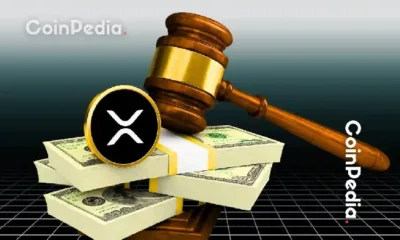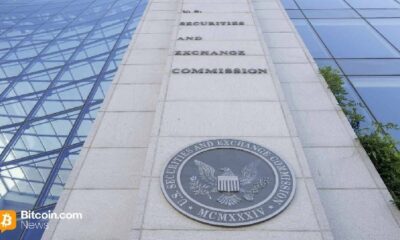Policy & Regulation
SEC goes after Cumberland, Tether’s biggest customer

Credit : cryptonews.net
Tether’s favourite market maker Cumberland International has been focused by the US securities regulator, doubtlessly pushing the world’s largest stablecoin issuer nearer to a regulatory reckoning.
On October 10, the U.S. Securities and Change Fee (SEC) introduced the submitting of a civil grievance in opposition to Cumberland DRW LLC within the U.S. District Court docket for the Northern District of Illinois. The SEC accuses Cumberland, an offshoot of Chicago-based DRW Buying and selling Group, of “performing as an unregistered vendor in additional than $2 billion of crypto belongings provided and offered as securities” since March 2018.
The grievance accuses Cumberland of constructing “hundreds of thousands of {dollars} in ill-gotten features” by shopping for and promoting the aforementioned unregistered securities with out registering as a securities vendor with the SEC. By doing so, Cumberland disadvantaged buyers and markets “of the protections of the registration provisions of the federal securities legal guidelines.”
The SEC says that since launching the platform in early 2019, Cumberland has allowed “greater than 1,500 high-net-worth people and entities” to behave as counterparties on Cumberland’s Marea on-line buying and selling platform. These counterparties embrace “distinguished individuals within the crypto asset area, akin to funds managed by crypto asset funding companies and sure now-defunct crypto asset hedge funds.”
Cumberland additionally engages in ‘discretionary threat taking’ by taking lengthy or quick positions on varied tokens, in addition to ‘proprietary technique buying and selling’ on third celebration exchanges (together with Binance, Bittrex, Coinbase (NASDAQ: COIN), Kraken and Poloniex ). . These and different operations generated greater than $400 million in income and $27 million in earnings for Cumberland since 2019.
The SEC cited a “non-exhaustive checklist” of the tokens traded by Cumberland that the regulator considers unregistered securities: Polygon Know-how (previously MATIC, now POL); Solana (SOL); Cosmos (ATOM); Algorand (ALGO); and Filecoin (FIL). The SEC alleges that every of those belongings “was provided and offered as an funding contract since its inception.” These tokens characterize “at the very least $2 billion” of Cumberland’s buying and selling quantity cited within the grievance.
Statements made by the issuers and promoters of those tokens “would have induced goal buyers to moderately view” gives to purchase or promote the tokens as “gives to purchase and promote funding contracts.” The SEC then offers particular particulars on how these tokens set off the varied planks of the Howey Take a look at for figuring out securities that require registration with the SEC.
The SEC seeks to completely bar Cumberland from additional violations of the Change Act, and to compel Cumberland to disgorge (with curiosity) any unlawful buying and selling earnings derived from the unlawful conduct alleged within the grievance.
Cumberland says ‘convey it’
In response, Cumberland issued a defiant assertion calling itself “the newest goal of the SEC’s enforcement-focused method to stifle innovation and forestall reputable corporations from coping with digital belongings.”
Cumberland claimed to have had “5 years of fine religion discussions with the SEC” about whether or not its trades concerned unregistered securities. However the grievance is claimed to be “the primary time the SEC has outlined the precise transactions at challenge.”
Cumberland “acquired a registered broker-dealer in 2019,” however claims the SEC knowledgeable him that “we might solely use our broker-dealer to commerce BTC or ETH,” which Cumberland insists are commodities and thus not topic to fall beneath the jurisdiction of the SEC.
Cumberland acknowledged that it “is not going to make any modifications to our enterprise operations or the belongings through which we offer liquidity” on account of the SEC’s grievance. Cumberland claims to be “assured in our robust compliance framework and disciplined adherence to all identified guidelines and laws.”
Cumberland recalled the father or mother firm’s profitable authorized battle with the Commodity Futures Buying and selling Fee (CFTC) when it was headed by present SEC Chairman Gary Gensler. After beforehand prevailing over “overzealous regulators who train their energy in ways in which hurt slightly than profit the market,” Cumberland is “able to defend ourselves once more.”
Tether ties
In 2021, Cumberland was revealed as the most important recipient of then-issued USDT (Tether), even forward of the now-defunct Alameda Analysis, the corrupt offshoot of Sam Bankman-Fried’s equally corrupt FTX digital asset alternate.
Given its USDT whale standing, Cumberland could be in a wonderful place to substantiate or deny Tether’s oft-repeated historic declare that it solely issued USDT after receiving an equal quantity of US {dollars}. Tether has since launched some leeway into this benchmark, admitting that it generally accepts digital belongings like BTC as an alternative of {dollars}, and even lends USDT to individuals Tether appears to assume are good for it.
Only for context, the SEC’s grievance in opposition to Cumberland adopted the Division of Justice’s (DOJ) felony fees in opposition to a handful of small market makers for manipulating the costs of varied memecoins (in addition to BTC).
It is value remembering that the DOJ’s indictment reportedly started with an SEC investigation, which finally uncovered sufficient proof of criminality to warrant the involvement of the DOJ. The previous just isn’t all the time prologue, however there are a variety of different ominous harbingers floating round.
Final week, the DOJ introduced a $3 billion settlement with TD Financial institution over violations of the Financial institution Secrecy Act and cash laundering legal guidelines that benefited drug traffickers and different criminals. Over a six-year interval, TD Financial institution did not adequately monitor greater than $18 trillion of buyer transactions, of which $670 million was transferred by cash laundering networks.
In saying the costs, U.S. Lawyer Common Merrick Garland alleged that “by making its providers straightforward for criminals, TD Financial institution turned one… TD Financial institution selected revenue over compliance with the legislation – a call that has now value the financial institution billions of {dollars} in fines. ”
These phrases might show prophetic for Tether, given USDT’s well-deserved fame because the premier “crime forex” utilized by pig slaughter scammers, cash launderers, drug traffickers, terrorists, and different poisonous corners of humanity. Tether’s management ranks might give American shores a large lead, however Cumberland has no such luxurious.
Garland stated the DOJ had not but completed submitting fees within the case. I suppose we simply have to attend for the opposite shoe to drop.
Bitnomial would not wait
In the meantime, different ‘crypto’ operators aren’t ready for Gensler & Co. knocks on their door. On October 10, Chicago-based Bitnomial ‘crypto futures & choices’ alternate filed a grievance in opposition to the SEC, accusing the regulator of exercising jurisdiction over ‘futures contracts on a digital asset’, particularly futures involving to the XRP token issued by Ripple Labs. .
Bitnomial’s lawsuit notes that the corporate – a CFTC-approved designated contract market – notified the CFTC in August of its plans to supply an XRP US Greenback Futures contract. Bitnomial was shortly contacted by the SEC, which warned that XRP Futures are safety futures that fall beneath the joint CFTC/SEC jurisdiction.
The SEC has had a protracted (and ongoing) battle with Ripple over whether or not XRP represents an funding contract. Bitnomial rejects the SEC’s place that XRP is a safety, but in addition claims that registering XRP with the SEC is inconceivable. As such, the SEC has “successfully blocked Bitnomial from itemizing XRP Futures.”
Bitnomial desires the U.S. District Court docket for the Northern District of Illinois to (a) declare that XRP Futures usually are not safety futures and (b) order the SEC to “train jurisdiction over XRP Futures or provoke or pursue any enforcement motion in opposition to Bitnomial with respect to to the goal itemizing of XRP Futures.”
Bitnomial just isn’t the primary to file a preemptive lawsuit in opposition to the SEC. Final week, the Crypto.com alternate noticed its authorized transfer after it acquired a discover from Wells of the SEC indicating that an enforcement motion in opposition to the alternate was imminent.
Ethereum-based blockchain software program firm Consensys tried to file an identical lawsuit in April, however the swimsuit was dismissed final month by a federal choose who reminded Consensys that it had not but been harmed by the SEC, so relaxation straightforward.
The decision comes from inside
Cumberland’s pejorative view of the SEC’s anti-crypto actions was echoed by SEC Commissioner Mark Uyeda, who informed Fox Enterprise final week that the SEC’s “insurance policies and our method over the previous few years have merely been a catastrophe for the entire.” [crypto] business.” Uyeda claimed that most of the SEC’s crypto enforcement actions centered on “immaterial issues that won’t change earnings.”
Uyeda claimed that there was “a broader frustration over the truth that [the SEC has] no interpretive steerage offered as to what you possibly can and can’t do and whether or not you’re concerned in any type of securities providing.” Uyeda stated there was “a necessity to supply clear steerage and interpretations on what precisely falls inside and outdoors these securities legal guidelines.”
However as others have famous, the SEC’s official place stays that present securities legal guidelines are clear sufficient for “crypto” operators to know the place the traces are drawn. As Gensler himself just lately stated, “Disliking the foundations just isn’t the identical as there being no guidelines.”
Gensler confronted some criticism amongst legislation college students final week throughout a “hearth chat” on the New York College Regulation Institute for Company Governance and Finance. Requested whether or not the 1946 Supreme Court docket determination establishing the Howey take a look at is one of the best barometer for figuring out securities, Gensler stated whether or not he favored it or not, “it is the legislation of the land.”
Gensler additionally famous final month’s Federal Bureau of Investigation (FBI) report that discovered the greenback worth misplaced to crypto-linked fraud rose 45% final 12 months to $5.6 billion, sharply noting that there are “a variety of fraudsters, a variety of scammers, a variety of scams” on this sector. Gensler summed it up with this pointed remark: “With all due respect, the main figures on this subject… are at present in jail or awaiting extradition.”
Watch: Teranode and the Web3 world with an edge-to-edge digital worth system
title=”YouTube video participant” frameborder=”0″ permit=”accelerometer; autoplay; clipboard-write; encrypted media; gyroscope; picture-in-picture; web-share” referrerpolicy=”strict-origin-when-cross- origin ” allowfullscreen=””>
-

 Meme Coin6 months ago
Meme Coin6 months agoDOGE Sees Massive User Growth: Active Addresses Up 400%
-

 Blockchain12 months ago
Blockchain12 months agoOrbler Partners with Meta Lion to Accelerate Web3 Growth
-

 Videos12 months ago
Videos12 months agoShocking Truth About TRON! TRX Crypto Review & Price Predictions!
-

 Meme Coin1 year ago
Meme Coin1 year agoCrypto Whale Buys the Dip: Accumulates PEPE and ETH
-

 NFT9 months ago
NFT9 months agoSEND Arcade launches NFT entry pass for Squad Game Season 2, inspired by Squid Game
-

 Solana4 months ago
Solana4 months agoSolana Price to Target $200 Amid Bullish Momentum and Staking ETF News?
-

 Ethereum1 year ago
Ethereum1 year ago5 signs that the crypto bull run is coming this September
-

 Gaming1 year ago
Gaming1 year agoGameFi Trends in 2024
































